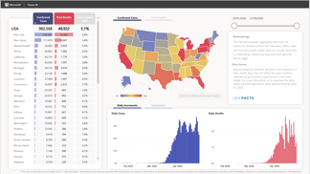How Microsoft Azure and Power BI are helping the fight against COVID-19
The COVID-19 pandemic is a huge public health issue affecting unprecedented numbers of people across the globe. But beyond the direct consequences, measures to contain it and delay its spread are causing upheaval to businesses, health care providers, governments and more. With everyone working together to beat the virus – from the public following strict social isolation guidelines to the NHS staff on the frontline – what role can business intelligence play?
The novel coronavirus pandemic is, of course, far more than a data science problem. But governments and non-profit agencies are finding themselves suddenly having to deal with large amounts of complex data, all of which is changing minute by minute. Collecting, analysing and communicating this data to the wider community presents a significant challenge, especially when it needs to be updated daily – or better still, in real time.
This is where business intelligence can help. Cloud platforms, like Microsoft Azure, can help to collate and store the data so it can be accessed securely and effectively. Business reporting tools, like Microsoft Power BI, allow users to create interactive maps and dashboards that present real-time information in a highly visual, easy-to-understand format.
Keeping the public informed
Microsoft has created a free, off-the-peg Power BI tool kit allowing governments and local authorities to quickly publish up to date COVID-19 information for their communities. By publishing these reports, organisations can make the information accessible to the public.
According to Arun Ulag, Microsoft Power BI corporate vice president, the toolkit includes an embed code, a ready-made Power BI Desktop file (for the report shown below), Power BI Desktop and Power BI Publish to web.

[Photograph: Microsoft Power BI blog]
To make it even easier for organisations in the United States to publish their reports, Microsoft partnered with USAFacts, a nonpartisan, not-for-profit organisation, so that users can access their national COVID-19 dataset. The Microsoft Power BI community is also helping organisations around the world to help visualize COVID-19 data. Microsoft has created a special COVID-19 Gallery to showcase the best examples of its work.
Helping the NHS in a time of crisis
In the UK, Microsoft has teamed up with two other companies to help the NHS collate COVID-19 data and use it to identify who is at risk – helping them to efficiently allocate resources and decide where to place staff. The solution will be built on Microsoft’s Azure cloud platform and will combine information from different sources – including COVID-19 test data and call centres – into a single dashboard.
According to an NHSX blog, The power of data in a pandemic, “Microsoft is supporting NHSX and NHS England’s technical teams, who have built a backend data store on Microsoft’s cloud platform, Azure, to bring multiple data sources into a single, secure location.”
A major advantage that Microsoft Azure has over many platforms is that its built-in privacy policies safeguard data in the cloud – making it compliant with GDPR. This is essential as the data involved contains sensitive information. The NHS has also assured the public that the information will be used strictly for the purpose intended and the dashboard will be deleted as soon as it is no longer needed. Until then, the solution will play a major role in helping the NHS understand where the next outbreak is likely to occur, and, according to the blog, “where the system is likely to face strain first, be that on ventilators, beds or staff sickness.”
Find out how business intelligence can help you
These healthcare examples show how business intelligence and data analysis can help in in a national, and even worldwide crisis. But you don’t need to wait for the unexpected before taking advantage of the power of data analysis and business intelligence for your organisation. To learn how you can make better use of the data available to you, and how to communicate it easily and effectively to decision makers, contact us.



